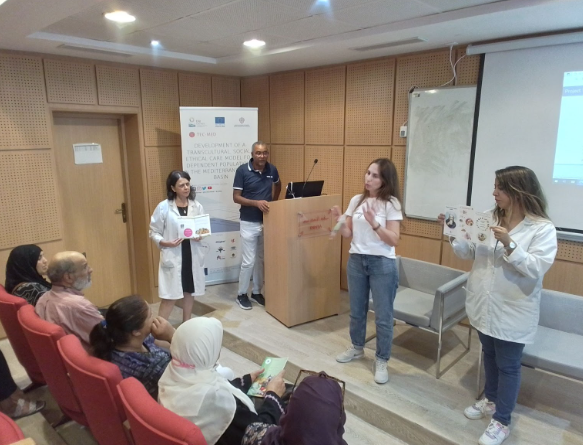TEC-MED project promotes physical mobility and psychological care for the elderly through training courses

The transcultural social-ethical-care model TEC-MED for dependent elderly or at risk of social exclusion in the Mediterranean basin is based on the Patient and family-centered collaborative care approach. This innovative model is based on a relevant software TEC-MED platform multilanguage, multiple roles, caring system, e-learning, oriented to elderly empowerment, and a user-centric ubiquitous communication and collaboration involving roles such as training agents, final users, and caregivers, both formal and family.
Elderly people are invited to free and holistic health assessment services through the TEC-MED caring platform with personalized interventions. The TEC-MED care model Interventions aim at building the capacity of older persons and their caregivers and improving their quality of life through a holistic approach to care and service delivery.
In practice; these interventions facilitate continuity of care and directly targeted the patient's behavior, in terms of diet, and physical activity. emotional and spiritual well-being. These interventions included the enhancement of coordination of care and the orientation of specialized consultation if necessary and also Capacity building on digital literacy
Intervention in digital literacy with elderlies and family caregivers to enhance the use of the TEC-MED platform
Training agents are working closely with seniors and their family caregivers to facilitate, engage, and interact with users for optimal learning experiences. and explaining the advantages of using a caring platform to take full advantage of holistic interventions. Accessibility to the platform can be a problem for isolated and illiterate elderly people or those with a low level of education and digital literacy.
Intervention in promoting Physical Activity Exercise among Older People as daily activity
The workshop set up a series of exercises to perform at home on a daily basis. The objective of these workshops with effective educational interventions for the promotion of physical activity for elderlies is to improve the mobility of the elderly and thereby improve their health and decrease the risk of chronic diseases.
Workshop: Medication Without Harm for elderlies and families in the INNTA’s outpatient department.
Much advice was carried through workshops to elderly patients and their families to reduce the incidence and adverse effects of polypharmacy medication and on the use of medicine in a safe way. On the other hand, for patients with diabetes who take insulin or other injectable diabetes medications, the INNTA’s (National Institute of Nutrition and Food Technology) nurse and training agent in the pilot phase taught evidence-based standardized methods to improve clinical outcomes. The Training agent nurse in the TEC-MED pilot and educator at INNTA ‘s outpatient department gave the advice to enhance and maximize the:
- Patient engagement in self-care management
- An understanding of the action of the medication
- The comfort and technique of the injection: Safe and effective medication dosing including when and how to take insulin injections, site inspection, and rotation to decrease absorption variability
Workshop on healthy and balanced Diet
- A healthy and balanced diet is essential for the preservation of health capital. Associated with regular physical activity, it is the first asset for the prevention of the deterioration of the state of health. Avoiding overweight allows you to maintain the dynamism essential to maintaining mobility.
- Similarly, balanced meals strengthen the immune system and prevent the risks associated with cardiovascular disease, diabetes, osteoporosis, or certain cancers.
The Tunisian team (Nurses, dieticians, and doctors in human sciences) provides relevant and efficient interventions based on resources and guides for the education and orientation of patients and their families.
The interventions implemented during the pilot phase with the elderly and their families aimed to reduce acute events and complications, improve adherence to treatment and improve autonomy and quality of life, mentally, physically, and socially.









